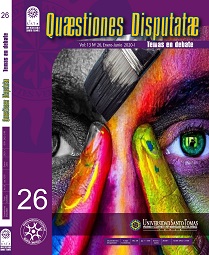Les tensions médiévales entre l'église et l'état : un point de vue de Thomas d'Aquin
##plugins.themes.bootstrap3.article.main##
Résumé
Le présent article a pour but de passer en revue l'ancrage de la pensée de Thomas d'Aquin dans les problèmes théologico-politiques qui se posent à son époque depuis la soi-disant "dispute de l'investiture" et sa résolution dans le Concordat de Worms de 1122. À cette fin, certains éléments fondamentaux du droit médiéval et leur relation avec le problème thomiste de la relation entre la loi éternelle, la loi naturelle et la loi humaine sont retracés. Il est proposé de défendre l'idée que le Docteur Angélique se situe à un point d'articulation entre une conception médiévale et une conception moderne de l'État qui commence à dissocier ce dernier de la tutelle de l'Église, en récupérant sa propre légitimité dans la recherche du bien commun.
##plugins.themes.bootstrap3.article.details##
Comment citer
Landinez Guio, D. (2020). Les tensions médiévales entre l’église et l’état : un point de vue de Thomas d’Aquin. Quaestiones Disputatae: Temas En Debate, 13(26), 18-32. Consulté à l’adresse http://revistas.ustatunja.edu.co/index.php/qdisputatae/article/view/2006
Rubrique
Articulos Num.26
De acuerdo a la Licencia Creative Commons Atribución-No Comercial-Sin Derivar 4.0 Internacional, se autoriza leer, descargar, copiar, distribuir, imprimir, buscar o enlazar los textos completos de estos artículos, siempre y cuando se conceda el crédito a los autores de los textos y a la Revista Quaestiones Disputatae: temas en debate, como fuente de publicación original. No se permite el uso comercial de copia o distribución de contenidos, así como tampoco la adaptación, derivación o transformación alguna de estos sin la autorización previa de los autores y de la dirección de Quaestiones Disputatae: temas en debate.

Esta obra está bajo una licencia de Creative Commons Reconocimiento-NoComercial-SinObraDerivada 4.0 Internacional.
Références
Browne, P. W. (1922). The Pactum Callixtinum: An Innovation in Papal Diplomacy. The Catholic Historical Review, 8 (2), 180-190.
Bueno de Mesquita, B. (2000). Popes, Kings, and Endogenous Institutions: The Concordat of Worms and the Origins of Sovereignty. International Studies Review, 2 (2), 93-118.
Carpintero-Benítez, F. (2013). Sobre la ley natural en Tomás de Aquino. Díkaion, 22 (2), 205-246.
Catto, J. (1976). Ideas and Experience in the Political Thought of Aquinas. Past & Present, 71, 3-21.
Chodorow, S. (1971). Ecclesiastical Politics and the Ending of the Investiture Contest: The Papal Election of 1119 and the Negotiations of Mouzon. Speculum, 46 (4), 613-640.
Copleston, F. (1983). Historia de la filosofía: de san Agustín a Escoto. Barcelona: Editorial Ariel. Tomo II.
Donnelly, J. (1980). Natural Law and Right in Aquinas' Political Thought. The Western Political Quarterly, 33 (4), 520-535.
González, A. M. (2010). Claves filosóficas de la ley natural. Scripta Theologica, 42, 387-407
Goyette, J. (2013). On the Transcendence of the Political Common Good. Aquinas versus the New Natural Law Theory. The National Catholic Bioethics Center, 13 (1), 133–155.
Mendieta y Núñez, L. (1951). La Sociología en la Edad Media. Revista Mexicana de Sociología, 13 (2), 227-235.
Mundy, J. H. (1980). Europa en la Alta Edad Media (1150-1309). Madrid: Aguilar.
Pirenne, H. (2008). Mahoma y Carlomagno. Madrid: Alianza.
Ruiz Rodríguez, V. (2016). Santo Tomás de Aquino en la filosofía del derecho. EN-CLAVES del pensamiento, (19), 13-40.
Tomas de Aquino. (1993). Suma de teología. Madrid: Biblioteca de autores cristianos. Prima Secundae, Cuestiones 90-97. Tomo II.
Weckmann, L. (1993). El pensamiento político medieval y los orígenes del derecho internacional. México: FCE.
Westberg, D. (1994-1995). The Relation between Positive and Natural Law in Aquinas. Journal of Law and Religion, 11(1), 1-22.
Bueno de Mesquita, B. (2000). Popes, Kings, and Endogenous Institutions: The Concordat of Worms and the Origins of Sovereignty. International Studies Review, 2 (2), 93-118.
Carpintero-Benítez, F. (2013). Sobre la ley natural en Tomás de Aquino. Díkaion, 22 (2), 205-246.
Catto, J. (1976). Ideas and Experience in the Political Thought of Aquinas. Past & Present, 71, 3-21.
Chodorow, S. (1971). Ecclesiastical Politics and the Ending of the Investiture Contest: The Papal Election of 1119 and the Negotiations of Mouzon. Speculum, 46 (4), 613-640.
Copleston, F. (1983). Historia de la filosofía: de san Agustín a Escoto. Barcelona: Editorial Ariel. Tomo II.
Donnelly, J. (1980). Natural Law and Right in Aquinas' Political Thought. The Western Political Quarterly, 33 (4), 520-535.
González, A. M. (2010). Claves filosóficas de la ley natural. Scripta Theologica, 42, 387-407
Goyette, J. (2013). On the Transcendence of the Political Common Good. Aquinas versus the New Natural Law Theory. The National Catholic Bioethics Center, 13 (1), 133–155.
Mendieta y Núñez, L. (1951). La Sociología en la Edad Media. Revista Mexicana de Sociología, 13 (2), 227-235.
Mundy, J. H. (1980). Europa en la Alta Edad Media (1150-1309). Madrid: Aguilar.
Pirenne, H. (2008). Mahoma y Carlomagno. Madrid: Alianza.
Ruiz Rodríguez, V. (2016). Santo Tomás de Aquino en la filosofía del derecho. EN-CLAVES del pensamiento, (19), 13-40.
Tomas de Aquino. (1993). Suma de teología. Madrid: Biblioteca de autores cristianos. Prima Secundae, Cuestiones 90-97. Tomo II.
Weckmann, L. (1993). El pensamiento político medieval y los orígenes del derecho internacional. México: FCE.
Westberg, D. (1994-1995). The Relation between Positive and Natural Law in Aquinas. Journal of Law and Religion, 11(1), 1-22.

